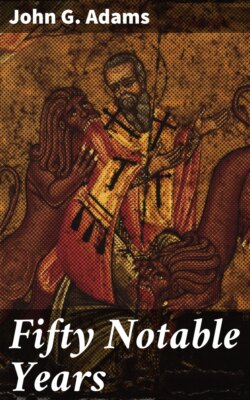Читать книгу Fifty Notable Years - John G. Adams - Страница 8
Оглавление"What binds one, binds all,
Love of things true and right."
Men have, too, a common interest under the Divine guardianship. Wherever there is a man, there is a being in whose soul God has implanted aspirations after himself, a propensity to religion, a feeling after him which may be misled by superstition, or overlaid by ignorance, or elevated by knowledge into purest piety, but which is yet there. Wherever he exists the Sovereign Power holds him in discipline, demands an account from him at his tribunal of impartial justice, and will not permit him to go out of his hands. To whatever heights he ascends, God still encompasses him; into whatever depths he may fall, he is still held by the guardian beneficent power.
One destiny, also, is affirmed of this great body of humanity; a blessing instituted in the beginning, including all families, kindreds, nations. No divine favoritism towards one over another do we see. The law and the prophets point towards this universal grace of God to man. Israel and the Gentile world shall alike share it. The apocalyptic vision opens it up to the eye of faith. "And every creature which is in heaven, and on the earth, and under the earth, and such as are in the sea, and all that are in them, heard I, saying, Blessing, and honor, and glory, and power, be unto him that sitteth upon the throne, and unto the Lamb, for ever and ever."[10] What is this but the fact, and the ultimate completeness and glory of the unity of the race? One Father, Brotherhood, Saviour, Homage, Destiny.
Other theologies had made distinctions and endless separations in representing mankind; had denied, as they still deny, this fraternal relationship, this positive family connection; had represented God rather as an arbitrary sovereign than loving Father, and the Divine government a wilful monarchy instead of a just and merciful dispensation under which each soul is of equal value, and the good of one is the good of all. Unbelief has said, as in the language of Spinoza: "The right extends as far as the force of the natural right or law, jus et institutum naturæ is nothing more than the rules of the nature of each individual." The divisions and contentions, classes and castes, the impositions, frauds, and oppressions which have more or less marked the social relations of mankind, all come of this pernicious error growing out of the unchecked selfishness of the human heart. Christian Universalism forever contradicts this error. It affirms that the great body of humanity is one, and that it is death to sunder it. "If one member suffer, all the members suffer with it; if one rejoice, all rejoice together; for the body is not one member, but many."[11] In the affirmation of the Gospel, religious bigotry and exclusiveness find a constant reproof; undue boasting, arrogance, and pride are hushed by this grand conviction that "One is our Father who is in heaven, and all we are brethren." The broadest philanthropy is awakened everywhere in man. The world becomes the one great field of effort for the enlightenment, relief, upraising, and perfecting of humanity. In the strong and noble words of another: "Universalism and the Revolution began to rise together. They were rocked together in the same stormy days, in the cradle of American liberty.[12] The banner of Universalism is love. Let that banner be lifted up. It shall symbol yet the true idea of the Declaration of Independence, 'All men are created equal.' I look forward to the time when our flag shall wave in unsullied glory, not over smoking ruins, at the mast-head of our battle-ships, on bloody fields, from the parapets of our forts, merely; but the stars and stripes and the white banner together, floating over slaves redeemed, sinners converted, evil statutes abolished, the people united, and the North and the South one."[13]
[8] Bancroft's History of the United States, vol. viii.
[9] Acts, xvii. 24, 28.
[10] Rev. v. 18.
[11] 1 Cor. xii. 14, 26.
[12] When Rev. John Murray first preached in Faneuil Hall, Nov. 26, 1773, he discoursed from this appropriate text: "If the Son therefore shall make you free, ye shall be free indeed."—John, viii. 36.
[13] Rev. T. Whittemore, D. D. Speech at Faneuil Hall Festival, 1858.
